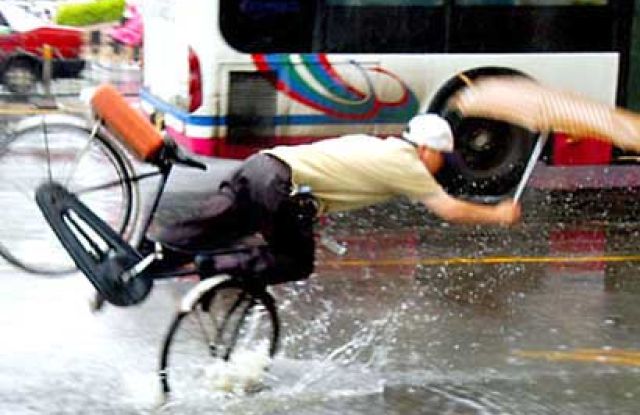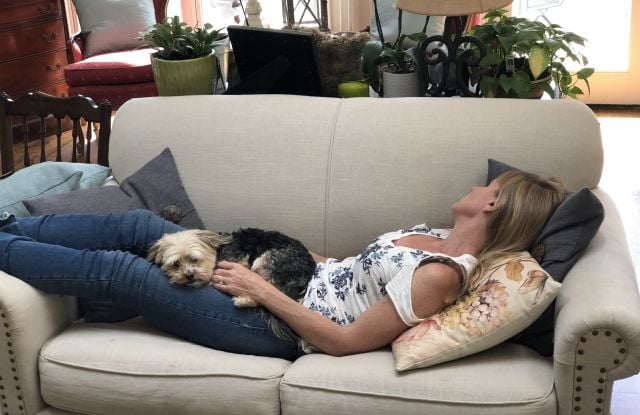Can Pain Be a Good Thing?


I went to the doctor and he had bad news for me. My cholesterol score was too high. Not only that, it turns out that there is bad cholesterol and good cholesterol. My bad score is too high and my good score is too low.
Pain is like that. There is good pain and bad pain. Pain can be a gift. Pain shows us that our actions have consequences. The pain of touching a hot stove teaches us that we don’t just need to experience pain if rules can help us avoid it.
When our oldest daughter, Talia, was a toddler, she learned a tough lesson one day. Karen called me at the office with the news, “Talia pulled a pot of hot grits onto her hand!”
It was traumatic for all of us. Fortunately the burns were just second degree and she healed up. But she learned the lesson of not reaching for things on a stove at an early age.
Think of the other kinds of pain that, though hard, ultimately help us. The pain of deprivation helps us to empathize with those who have little. The pain of failure gives us the incentive to try harder to succeed.
Many of us have confused good pain with bad pain as we’ve raised our children. And as our children have become adults, we continue our misguided project, not recognizing that at some point our children need consequences if they are to grow.
The difference between good pain and bad pain
How do you tell the difference between good pain and bad? Actually, all pain can in some way be good. The Bible tells us that “all things work together for good.” The key is to recognize that in the fight between good and evil, good will suffer setbacks. And with those setbacks will come pain.
But God wants to take the bad pain in our lives and redeem it. Jesus sets the ultimate example, taking on the pain of the world by dying on the cross. What the enemy intended for evil, God used redemptively.
When you see life this way, we are never victims. God never wastes the pain we endure. His plan is to use it for good.
Pain in families
So much of the world’s pain begins in our families. Too often, we dads don’t play the role we need to in protecting our family. Our wives, then step into the gap that we’ve left. They do what comes naturally – providing comfort when their kids were in pain.
So their kids grow up, deprived of the good pain they needed to grow into responsible adults. They make look like adults on the outside, but on the inside, they still expect mommy to “kiss it and make it better” whenever they encounter pain.
I want to suggest to you that as a group, young people need remedial pain. They need more good pain in their lives – consequences that they can learn from.
Today 300 Gap Year students and their leaders show up at our World Race base. Many have grown up in a family where they were shielded from the natural consequences of their actions. They have grown up in a generation that the media sometimes labels as “snowflakes” – ill-equipped to receive feedback.
Many arrive on our doorsteps having never been trusted with real responsibility. Parents often did this with good intentions. They have the thought, “My childhood was tough. My parents didn’t do so well – I’m going to make sure that my kids don’t have to struggle as I did.”
The inadvertent result is the stunted growth of their son or daughter. They didn’t get what they needed to become an adult. And now, too many lack resilience. Too many have been indulged instead of disciplined.
As our 300 Gap Year students will soon hear during training camp, there is a God in heaven who loves us. He has a design for our lives and pain is one of tools that he uses to shape us and mold us.
Understanding the role of pain – that we seek healing from the bad pain, but that we allow the good pain to be our teacher – is a start in getting us to the abundant life he promises us.



Seth, thanks for some provoking words in this post and you know mine come layered, laced and lavished with painful parts of a personal story. As a preamble, and I’ve said this privately, I think you are sometimes hard on dads. Mom’s check out, leave, avoid maternal instincts and inflict deep family pain as much as fathers do. That’s a different discussion and one I hope we have in a setting my just departed for Jerusalem Israeli friend calls a “four eyes meeting.” On another note America is in the throes of an opioid crisis. More people will die this year of overdoses than automobile accidents or the worst year of the Vietnam War. It affects 100% of AIM, WR and people affiliated with the movement. Why? The “Pain Index” instituted by doctors and profit hungry pharmaceutical companies created a *perfect storm* where a generation feels pain and runs for a drugstore–legally. When their prescriptions end they are often addicted–in its many forms–and go to readily available & powerful street drugs like heroin which is increasingly laced with adulterants. The fastest growing segment of intravenous drug users are often middle aged white women. The “on the street black junkie under a bridge” image is racist, wrong and not the current facts. One-out-of-five church attenders are engaged in active drug addictions which are potentially life threatening. I’m honest about the daily battle I fight not medicating with alcohol. Trust me. That is very tame compared to drugs never taken but sadly I’ve learned much about. We had several pastors through Bethel Colony of Mercy program in recent months. Meth. Cocaine. Heroin. All their “boosts” for a sermon. We don’t throw stones. I know many Christian leaders of note with their quiet addictions. The key is we have to incubate safe places for people to share their struggles. There aren’t many. That’s why 12 Step Groups–with all their flaws–still flourish. Let’s get together in August. Hope that might work. Love to the Barnes tribe. Tell Leah I’m still waiting to clean your kitchen. 🙂
That’s a good question, Katie. One that I went back and addressed in the blog post. Ultimately all pain can in some way be good. The Bible tells us that “all things work together for good.”
As always, Butch, your perspective is thoughtful. I especially appreciate your vulnerability. Lots of pain out there, and we fight most effectively when we fight from a place of vulnerability.
It’s true that I’m hard on dads. That’s because, in my experience, we have a lot to answer for. Over and over again I hear someone’s story begin with the neglect or abuse of a father. Mom’s naturally nurture, but dad’s don’t naturally do what we need to do.
Thanks, Seth. I appreciate your perspectives. Part of the equation with dad’s is that we are well into a shift in the culture where dad and male expectations shifted and especially in popular culture–like television series–dad’s were and are often painted as failures, buffoons, absent or in the end not engaged. I think the story is much more nuanced. Of course each of us generalize–I do–from a focus group of “one” and our grids and lenses filter the morass of information out there. I’m aware of many stories of absent, maternal deprivation oriented homes as evidenced by the 85 addicts I connect with often. There are more dad issues. But it’s not by much. Blessings friend.
Thanks, Seth. I appreciate your perspectives. Part of the equation with dad’s is that we are well into a shift in the culture where dad and male expectations shifted and especially in popular culture–like television series–dad’s were and are often painted as failures, buffoons, absent or in the end not engaged. I think the story is much more nuanced. Of course each of us generalize–I do–from a focus group of “one” and our grids and lenses filter the morass of information out there. I’m aware of many stories of absent, maternal deprivation oriented homes as evidenced by the 85 addicts I connect with often. There are more dad issues. But it’s not by much. Blessings friend.
What are your thoughts on how to differentiate between good and bad pain?